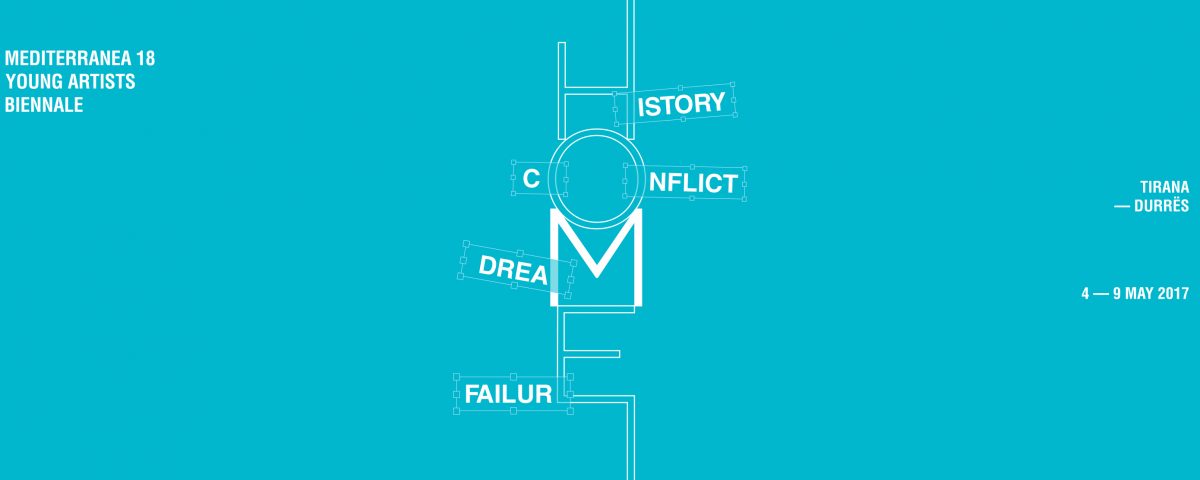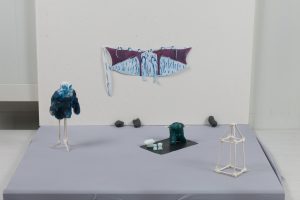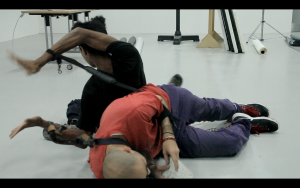
(ITA) “New Men’s Land. Storia e destino della Jungle di Calais”, di Gian Maria Tosatti
5 Giugno 2017
BJCEM alla “Notte di San Giovanni” XXIII° edizione, Ostuni, 24 giugno 2017
14 Giugno 2017Mediterranea 18 Young Artists Biennale: some interviews to participating artists

Mediterranea 18 Young Artists Biennale Tirana&Durres has been a beautiful and powerful experience in such an amazing country, and we enjoyed every minute of the incredible atmosphere and vitality brought there by the artists and curators.
From May 4 to 9, 230 under-35 artists from 23 countries animated the two cities and the almost 30 locations of the events, displayng their artistic productions in the fields of Applied Arts, Visual Arts, Performance, Literary Creation, Music and Film.
Now that the event ended, we interviewed some of the participating artists, to know more about their experience in Albania.
Artist Jürgen Kleft, Visual Arts, Austria

What were your expectations about your journey in Albania and what are your impressions abouth the event, now that you have returned back home?
I tried to come to Albania with close-to-no preconceptions or idées fixes so that I could absorb all impressions free from any mental barriers – and it worked out just fine. I felt very welcome and was overwhelmed by the warm-heartedness of the Albanian people. It is impressive to see how the recent – cruel – past is being dealt with, at least in daily life (my insight into Albanian politics is very limited, tough I need to state that Tirana has an extraordinary cool mayor).
One of the few things I knew before coming to Albania was that people are quite italophone. Even if this information matched reality, I was struck by how many languages I could use for simple and every day life communication. I especially remember a young waiter on his first day at work, who asked us to come by the next day as well so he could speak so more English (which, apparently, he enjoyed doing). The second, both ravishing and thought-provoking, experience I need to mention occurred a bit early that same day when we were invited in by the owner of a metal workshop. He showed us his truly beautiful machines from the 1970s and explained us the troubles he was having finding spare parts. He also told us about his family living in Germany and how this allowed him to communicate with us.
What do you bring back home from this experience, and how it enriched your personal and professional grow?
Honestly put, I wasn’t aware of how many people of my age are capable of playing the guitar. Even more honestly put, I enjoyed getting to know (some) of my colleagues from other countries, especially the Albanian one’s – I remember surprisingly well the one bar they brought me to (of which I won’t disclose the name). I would have loved to get acquainted to more participants, but unfortunately my work’s duties prevented me from doing so during the week in Tirana. Anyway, this experience lit the first spark – I hope that I will be able to provide some wood to keep the fire burning for a long time. I’ll be back.
Artist Nadia Mujkić, Literary Creation, Bosnia and Herzegovina

What were your expectations about your journey in Albania and what are your impressions abouth the event, now that you have returned back home?
I went to Albania last year for the first time and I visited couple of cities, like Tirana, Skadar, Elbasan… It seemed to me that Albania is pretty much similar to Bosnia, which is especially seen through inequality of rich and poor people. And then there is a compasion too, people ready to help you even before you asked them to. For example, this year when I was traveling together with a young band called Vox Meduza, the van that we were using broke down right after the border, so we came to Tirana on a tov truck. This could have been really frustrating if there wasn’t for local population, and it all ended with lot of laughter. It is really hard do describe it all, all the scents and colors of Albania. I didn’t expect anything this year, just as I didn’t expect anything for the first time. If you expect something it means that you already have clearly established development of future events, and that leads to dissapointment and anger if it does not go according to the plan. I was never a participant of similar project, and, as I don’t have anything to compare this to, I am really satisfied. It was really nice, as it should be when there is a lot of young people in one place. I had this feeling that there is nothing but Biennale at that point in Tirana.
What do you bring back home from this experience, and how it enriched your personal and professional grow?
I brought home memory of people that I have met. Those memoiries I turned into short poetic stories that I have been working on hard for the last year. Those that came to hear me read, under the rain, reminded me why I write and why I am what I am. Performances were organised so that we read in our mother tongue, and that is just great because we all feel good in our own language. After my second reading a girl came to me and said how she did not understood anything, but she enjoyed my reading anyway. And that is poetry – pure music, understood, of course, in her symbolic meaning. So, revelation of musical and picturesque beauties of a language, finding new comforts in harmony of voices, placing and connecting words. Poets transform one reality into the other, independent from a real word that surrounds us, so as such connecting poetry with society weakness her strength and value. But today it is not easy to avoid that, today when everything is transformed into merchandise. Events such as this one are enouraging and simulating, they are lighting marginal arts, which is poetry today, unfortunately; those kind of events where you come and read verses as people did thousands of years before you. And that is why I came back home happy.
Sadegh Aleahmad and Jamal Sterret, Performance, UK

What were your expectations about your journey in Albania and what are your impressions abouth the event, now that you have returned back home?
Sadegh
To be completely honest with you, I did not have any expectations (neither good or bad). However I felt extremely privileged to be in this Biennale and being able to see so many great artwork, and amazing architectures and buildings (including the abandoned sites). One thing that I would like to address is the confusion over the printed map, and the timetable for the artworks. I did get confused more than few times when trying to find a venue based on the information provided on the map.
In addition I felt there was a massive cultural difference between the Albanian mass culture and the British. I felt the Albanian culture were strangely similar to Iranian culture (where I am originally from). I personally would love to investigate this further if life gives me the opportunity to do so.
Jamal
Personally I expected the event to be smaller and not as big as it was. When I arrived at the event I was so happy to find how many people came. I also didn’t expect local Albanian people to participate in the events but they were really open to art and other people coming into their country which made me really happy to be their. I find that the event allowed people to globally network in a subject like never before in the past. If people were looking for a way to expand their work globally BJCEM would be a place I would recommend them to start looking.
What do you bring back home from this experience, and how it enriched your personal and professional grow?
Sadegh
I feel extremely privileged to be able to take part in this Biennale. I have been in touch with several artists from the Biennale and aiming to collaborate together in the near future. This makes this opportunity specially important and critical for emerging artist like myself.
Jamal
It gave me more motivation to travel with my art around the world. It opened my eyes to more possibility that their are people all around the world that I can relate to no matter what language we may speak. It also gave me inspiration for my own work from seeing how people of different backgrounds all see the same thing different.
